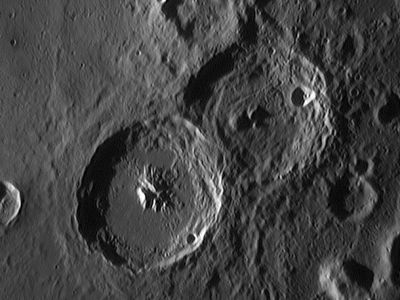Cyrillus
Contents
Cyrillus
|
Lat: 13.2°S, Long: 24.0°E, Diam: 98 km, Depth: 3.4 km, [/R%C3%BCkl%2046 Rükl: 46] |
Table of Contents

Oliver Pettenpaul
[/Theophilus Theophilus] is on the left, Cyrillus is on the right.
Images
LPOD Photo Gallery Lunar Orbiter Images Apollo Images
Maps
([/LAC%20zone LAC zone] 78C4) LAC map Geologic map LM map
Description
Description: Elger
([/IAU%20Directions IAU Directions]) CYRILLUS.--The massive border of [/Theophilus Theophilus] partially overlaps the N.E. side of this great walled-plain, which is even more complex than that of its neighbour, and far more irregular in form, exhibiting many linear sections. Its crest on the S.W. is clearly inflected towards the interior, a peculiarity that has already been noticed in connection with [/Copernicus Copernicus] and some other objects. On the inner slope of this wall there is a large bright crater, in connection with which have been detected two delicate rills extending to the summit. I have not seen these, but one of the crater-rows shown by Schmidt, between this crater and the crest, has often been noted. The N.W. wall is very remarkable. It appears to be partially wrecked. If observed at an early stage of sunrise, a great number of undulating ridges and rows of hillocks will be seen crossing the region W. of [/Theophilus Theophilus]. They resemble a consolidated stream of "ropy" lava which has flowed through and over the wall and down the glacis. The arrangement of the ridges within Cyrillus is very noteworthy, as is also the triple mountain near the centre of the floor. The fine curved cleft thereon traverses the E. side, sweeping round the central mountains, and then turning to the south. I have only occasionally seen it in its entirety. There are also two oblong dark patches on the S. side of the interior. The S. wall of Cyrillus is broken by a narrow pass opening out into a valley situated on the plateau which bounds the E. side of the oblong formation lying between it and [/Catharina Catherina], and overlooking a curious shallow square-shaped enclosure abutting on the S.E. side of Cyrillus.
Description: Wikipedia
Additional Information
- Depth data from [/Kurt%20Fisher%20crater%20depths Kurt Fisher database]
- Westfall, 2000: 3.4 km
- Cherrington, 1969: 3.59 km
- [/Central%20peak%20composition Central peak composition]: A ([/Tompkins%20%26%20Pieters%2C%201999 Tompkins & Pieters, 1999])
- Satellite craters Cyrillus A and G are on the [/ALPO%20list%20of%20bright%20ray%20craters ALPO list of bright ray craters].
- Satellite crater Cyrillus F is on the [/ALPO%20list%20of%20banded%20craters ALPO list of banded craters]
Nomenclature
- Saint Cyril of Alexandria (Cyrillus) (ca. 378 - ca. 444); Egyptian theologian and chronologist, was the Pope of Alexandria when the city was at its height in influence and power within the Roman Empire.
- Somewhere east or east-southeast of Cyrillus should be a crater (or another surface formation) which was known as A.Pavlov. This name is mentioned in the book THE MOON by A.V.Markov, but the I.A.U. did not accept that name.
- The cluster of central peaks at Cyrillus seems to have been called Cyrillus Alpha, Cyrillus Delta, and Cyrillus Eta.
LPOD Articles
A Classic Trio
Theo as You’ve Never See It
Sunrise on a Familiar Threesome
Linears
Lunar 100
[/Lunar%20100 L8]: "[/Theophilus Theophilus], Cyrillus, [/Catharina Catharina]", Crater sequence illustrating stages of degradation.
Bibliography
Wood, C.A. Nov. 2004. Ghost Craters and Lava Lakes S&T 11/2004:63
"A.Pavlov": THE MOON by A.V.Markov.
This page has been edited 1 times. The last modification was made by - tychocrater tychocrater on Jun 13, 2009 3:24 pm - afx2u2